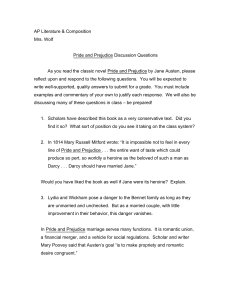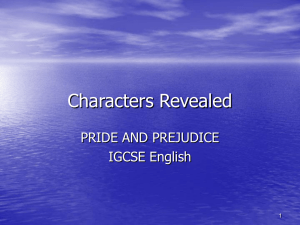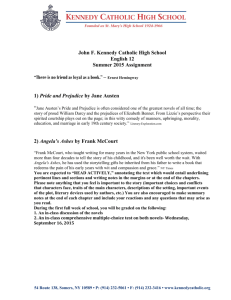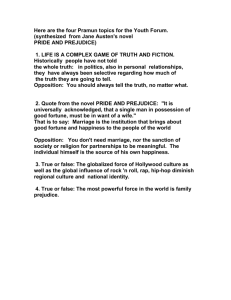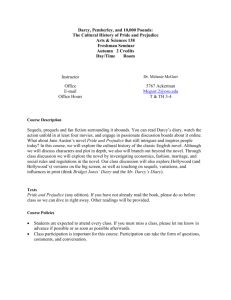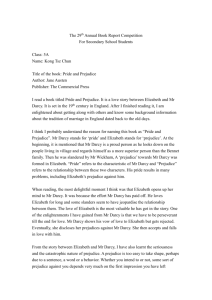Pride and Prejudice - To-read-or-not-to-read
advertisement
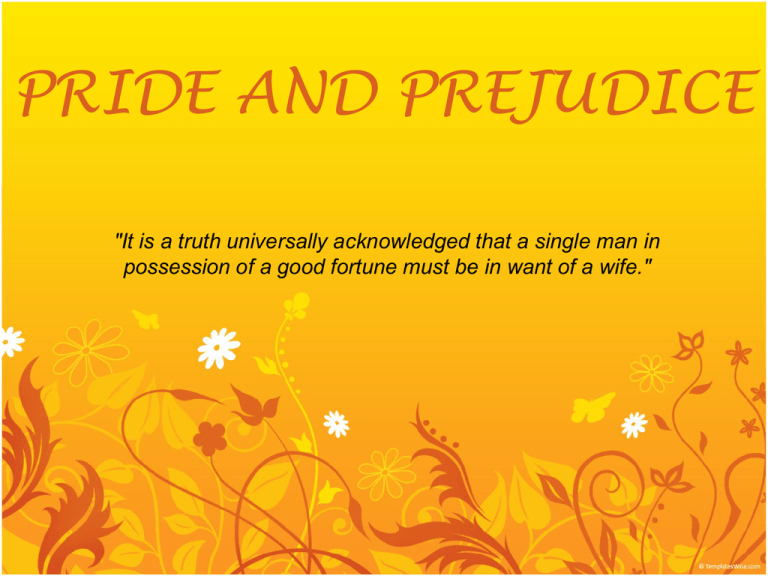
PRIDE AND PREJUDICE "It is a truth universally acknowledged that a single man in possession of a good fortune must be in want of a wife." JANE AUSTEN (1775-1817) -English novelist whose works of romantic fiction set among the gentry have earned Jane a place as one of the most widely read and most beloved writers in English literature. -Jane Austen was born in Steventon, Hampshire and she was the second daughter and seventh child in a family of eight. The first 25 years of her life, Jane spent in Hampshire. On her father's unexpected retirement, the family sold off everything, including Jane's piano, and moved to Bath. Jane Austen was mostly tutored at home, and irregularly at school, but she received a broader education than many women of her time. She started to write for family amusement as a child. -From 1811 until 1816, with the release of Sense and sensibility (1811), Pride and prejudice (1813), Mansfield Park (1814) and Emma(1816), she achieved success as a published writer. -Virginia Woolf called Austen "the most perfect artist among women”. -She can be also classified as Romantic. PRIDE AND PREJUDICE One of the world's most popular novels, Jane Austen's Pride and Prejudice has delighted readers since its publication with the story of the witty Elizabeth Bennet and her relationship with the aristocrat Fitzwilliam Darcy. It was begun in 1796 and the original manuscript was finished by 1797 in Steventon, Hampshire. Austen originally called the story First Impressions, but it was never published under that title; instead, she made extensive revisions to the manuscript, then published it as Pride and Prejudice in 1813. Pride and Prejudice is a humorous portrait of the social atmosphere of late eighteenth and early nineteenth-century in England, and it is principally concerned with courtship rituals of the English gentry. PLOT SUMMARY Pride and Prejudice focuses on Elizabeth Bennet and her relationship with Mr. Darcy. The women are concerned about finding husbands because if Mr. Bennet were to die, the estate would be left to their pompous cousin, Mr. Collins Mr. Bingley soon becomes attached to Jane, while Elizabeth grows to dislike his close friend, Mr. Darcy. Mr. Bingley eventually moves away to London. Mr. Collins marries Charlotte, Elizabeth’s friend instead of her. Mr. Darcy and Elizabeth encounter casually more than once; the fulfillment of their love story becomes a matter of time. In the end, despite Lady Catherine's attempt to prevent the engagement, Elizabeth marries Mr. Darcy. PRIDE AND PREJUDICE Characteristics of the novel -It is written in gentle/Horacian satire; -The main object of Austen’s satire in the novel is the mercenary and the ignorance of the people; -The tone of the novel is comic, or, in Jane Austen’s own words, “light and bright, and sparkling” -The atmosphere is intellectual and cold; -The point of view in Pride and Prejudice is limited omniscient; -The main actions of the novel are the interactions between opinions, ideas, and attitudes; -The tense used is past tense; -The climax: Mr. Darcy`s proposal to Elizabeth (volume 3, chapter XVI) CHARACTERS The Bennets Mr. Bennet – an intelligent gentleman not pleased with the inadmissible behaviors of his wife and his 3 younger daughters. He is content to laugh at his daughters because of their behaviors. Mr. Bennet has a sarcastic, cynical sense of humor that he uses to purposefully irritate his wife He relates very well with his 2 elder daughters, Jane and Elizabeth, to whom shows much more love and respect. Mrs. Bennet – Mr. Bennet’s wife, a foolish, noisy woman whose only goal in life is to see her daughters married. Her public manners and social climbing are embarrassing to Jane & Elizabeth; favourite daughter: Lydia, the youngest. Elizabeth (Lizzy) – the main character and protagonist. She is intelligent, lively, and attractive, with tendency to judge on first impressions, her closest relationships are with: Mr. Bennet, Jane, Mrs. Gardnier, and Charlotte Lucas. She was considered by Jane Austen “the most enchanting being who was ever printed” Jane – the eldest sister. She is considered to be the most beautiful young lady in the neighbourhood. Jane is more reserved and gentler than Elizabeth. She wants to see only the best in others. Mary - She works hard for knowledge and accomplishment, but has neither genius nor taste. Catherine (Kitty) – a silly shadow of Lydia. Lydia - Her main activity in life is socialising, especially flirting with the military officers stationed in the nearby town of Meryton. She is supported in the family by her mother. CHARACTERS Mr. Fitzwilliam Darcy – the main male character. Handsome, tall, intelligent and rich, he seems to be the perfect man, but he is too concerned with his social status. He is valued by the people who know him well. He is known to be “the most desired bachelor from the universal literature” Georgiana Darcy - Mr. Darcy’s younger sister. She is very happy with her brother's choosing of Elizabeth and maintains a close relationship with them both. Charles Bingley – Handsome, good-natured, wealthy, kinder and more charming than Mr. Darcy. He is easily influenced by others. Caroline Bingley – Sister of Charles, she is jealous of the relationship between Darcy and Lizzy. William Collins – Mr. Bennet’s cousin, "not a sensible man, and the deficiency of nature had been but little assisted by education or society". Lady Catherine de Bourgh – Arrogant, she lacks manners. Edward Gardnier – a successful businessman in London, quite sensible and Gentleman-like. Mrs. Gardnier - a mentor for Elizabeth and Jane. George Wickham - A handsome, fortune-hunting militia officer. RELATIONSHIPS BETWEEN CHARACTERS THEMES Love Pride and Prejudice contains one of the most cherished love stories in English literature: the courtship between Darcy and Elizabeth. As in any good love story, the lovers must elude and overcome numerous stumbling blocks, beginning with the tensions caused by the lovers’ own personal qualities. Elizabeth’s pride makes her misjudge Darcy on the basis of a poor first impression, while Darcy’s prejudice against Elizabeth’s poor social standing blinds him, for a time, to her many virtues. Reputation Pride and Prejudice depicts a society in which a woman’s reputation is of the utmost importance. A woman is expected to behave in certain ways. Stepping outside the social norms makes her vulnerable to ostracism. This theme appears in the novel, when Elizabeth walks to Netherfield and arrives with muddy skirts. Class The theme of class is related to reputation, in that both reflect the strictly regimented nature of life for the middle and upper classes in Regency England. The lines of class are strictly drawn. While the Bennets, who are middle class, may socialize with the upperclass Bingleys and Darcys, they are clearly their social inferiors and are treated as such. MOTIFS AND SYMBOLS MOTIFS Courtship In a sense, Pride and Prejudice is the story of two courtships—those between Darcy and Elizabeth and between Bingley and Jane. Within this broad structure appear other, smaller courtships: Mr. Collins’s aborted wooing of Elizabeth, followed by his successful wooing of Charlotte Lucas; Journeys Nearly every scene in Pride and Prejudice takes place indoors, and the action centers around the Bennet home in the small village of Longbourn. Nevertheless, journeys—even short ones—function repeatedly as catalysts for change in the novel. Elizabeth’s first journey, by which she intends simply to visit Charlotte and Mr. Collins, brings her into contact with Mr. Darcy, and leads to his first proposal. SYMBOLS Pemberley Pride and Prejudice is remarkably free of explicit symbolism, which perhaps has something to do with the novel’s reliance on dialogue over description. Nevertheless, Pemberley, Darcy’s estate, sits at the center of the novel, literally and figuratively, as a geographic symbol of the man who owns it. CRITICISM John Halperin mentions in his piece of work, “Inside Pride and Prejudice” “The novel may also tell us something about Jane Austen’s views on a few issues, for there is a good deal of old-fashioned, unashamed preaching in it. Some examples: “Happiness in marriage is entirely a matter of chance.” “Do any thing rather than marry without affection.” “How little of permanent happiness could belong to a couple who were only brought together because their passions were stronger than their virtue.” “Nothing is more deceitful … than the appearance of humility. It is often only carelessness of opinion, and sometimes an indirect boast.” “It is very often nothing but our own vanity that deceives us.” “Think only of the past as its remembrance gives you pleasure.”
